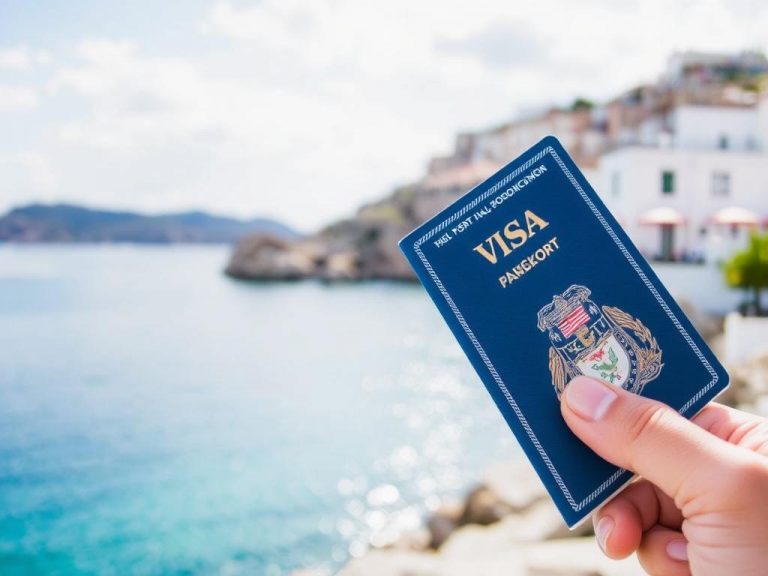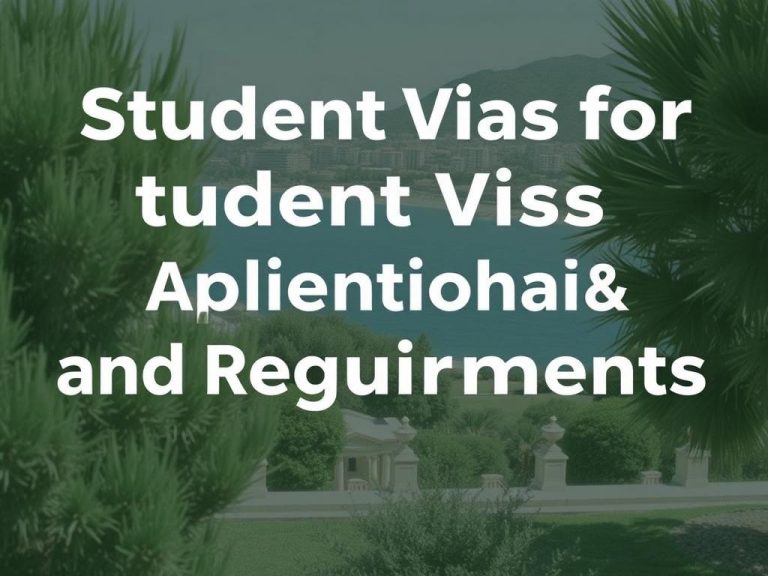Cyprus Visa Processing Times: What to Expect in 2025
Understanding the intricacies of visa processing is crucial for anyone planning to visit, work, or settle in Cyprus. In 2025, the dynamics of visa processing times Cyprus will be influenced by several factors, including changes in immigration policies, global travel trends, and local bureaucratic adjustments. This article offers a comprehensive and detailed examination of the application timeline Cyprus, potential embassy delays Cyprus, and effective strategies for visa status tracking Cyprus.
The Framework of Cyprus Visa Applications
Before delving into the processing times, it’s important to understand the general framework governing visa applications in Cyprus. Cyprus, as an EU member state, follows specific rules for short-term Schengen-type visas (though Cyprus is not a full Schengen member, it aligns closely with these rules) and long-term national visas for employment, study, and residency purposes. Each visa type has its own set of requirements, which can affect processing duration.
Short-stay visas, particularly for tourism or business, typically involve less documentation and shorter processing periods compared to long-stay visas, which require extensive background checks and verification.
Visa processing times are influenced not just by policy but by the type of visa and the completeness of documentation provided.
Applications are generally submitted to the Cyprus Embassy or Consulate in the applicant’s home country, with some applicants opting to use third-party visa application centers. The embassy acts as the gatekeeper, performing identity verification, security checks, and other procedural steps that directly impact the overall processing timeline. In this context, understanding the embassy’s operational procedures helps explain the variability in processing durations.
Typical Visa Processing Times Cyprus: What to Expect in 2025
Visa processing times for Cyprus in 2025 will likely adhere to established norms, but with some variations based on volume, security circumstances, and administrative efficiency. Here is a breakdown of expected timelines depending on visa category:
| Visa Type | Average Processing Time | Key Processing Factors |
|---|---|---|
| Short-stay Schengen-type Visa (up to 90 days) | 7 to 15 calendar days | Basic identity/security checks, biometric data collection |
| Long-stay National Visa (Employment, Residency, Study) | 30 to 90 calendar days | In-depth background verification, employer/school confirmation |
| Student Visa | 30 to 60 calendar days | Verification with academic institutions, financial proofs |
| Family Reunification Visa | 45 to 90 calendar days | Relationship verification, financial dependency checks |
The above durations represent average expectations. In reality, applicants should anticipate fluctuations depending on external factors such as geopolitical events, changes in embassy staffing levels, and peak travel seasons. For instance, summer months usually see an increase in short-stay visa applications, which can cause temporary slowdowns.
While processing times provide a guideline, applicants must factor in potential delays during peak seasons or due to enhanced security measures.
Understanding Embassy Delays Cyprus: Causes and Mitigation
Embassy delays in Cyprus have become a notable concern for many applicants in recent years. These delays can extend the application timeline Cyprus significantly and cause frustration for those relying on timely decisions. Several common causes contribute to embassy delays Cyprus:
- High Volume of Applications: The Cyprus Embassy often experiences surges in application volumes, especially around holiday seasons or political developments encouraging travel.
- Staffing Challenges: Periodic understaffing due to budget constraints or employee turnover can slow application processing.
- Increased Security Checks: Heightened security protocols may require additional background checks and document verifications, adding days or weeks.
- Technical Issues: Electronic systems used for registration, biometric capture, or data transmission occasionally face outages or glitches.
Applicants are therefore urged to prepare for potential delays by submitting their applications well in advance. It is also advisable to maintain close communication with the embassy or visa application center during the wait period.
Embassy delays often stem from factors beyond applicant control, highlighting the need for early and thorough preparation.
Methods and Tools for Visa Status Tracking Cyprus
In 2025, digital advances continue to improve transparency in visa queues, but applicants still need to know how to monitor their visa status tracking Cyprus. The Cyprus Ministry of Foreign Affairs, in collaboration with various embassies, offers several channels for tracking visa applications:
Online Portals: Most Cyprus embassies provide secure online portals where applicants can enter their reference or case number to check current visa status. These portals update processing stages such as application receipt, biometrics collected, and final decision submitted.
Email and Telephone Inquiries: For those who prefer direct contact, embassies allow status inquiries via email or phone. However, response times vary and may be limited during busy periods.
Visa Application Centers: In countries where third-party visa application centers are employed, these centers often provide their own tracking services designed to give applicants clearer visibility into progress.
Employing these tools strategically helps applicants manage expectations and plan accordingly, reducing anxiety during the waiting period.
Factors Affecting the Application Timeline Cyprus in 2025
The application timeline in Cyprus is not static. Several external and internal factors influence the speed at which a visa is processed.
Documentation Completeness: One of the primary reasons for delays is incomplete or inaccurate documentation. Cyprus embassies require precise forms, valid passports, supporting documents, and payment proofs. Incomplete submissions often lead to additional requests for information, elongating processing times.
Type of Visa Requested: As outlined earlier, short-stay visas are generally faster, while long-stay visas undergo more rigorous scrutiny.
Origin Country: Applicants from countries with higher perceived risks or complex diplomatic relations with Cyprus may experience longer processing times due to additional checks.
Political and Global Health Situations: Events like political instability, global pandemics, or travel bans can disrupt normal embassy operations, extend queues, and introduce new procedural steps.
Complete and accurate documentation remains the most controllable aspect impacting the Cyprus visa application timeline.
Preparing For Your Cyprus Visa Application in 2025
To ensure a smoother and more predictable processing timeline, applicants should undertake careful preparation prior to submission. Firstly, understanding the specific visa type requirements is vital. Cyprus embassy websites and official government portals provide detailed checklists outlining mandatory documents.
Secondly, early application is critical. Applying at least 60 days ahead of intended travel guards against unforeseen delays. Additionally, keeping copies of all submitted documents and receipts expedites responses to any embassy queries.
Engaging professional visa consultants can sometimes streamline the process, especially for complex cases, but this should be weighed against added costs and the need to maintain direct communication with official channels.
Anticipating Changes to Cyprus Visa Policies and Impact on Processing Times
The Cypriot government continuously evaluates immigration policies to balance security with economic and touristic growth. For 2025, anticipated changes include improved digitalization of visa processing and potential tightening of long-stay visa scrutiny to protect labor market integrity.
These alterations may slightly extend processing times for certain visa categories, but ongoing efforts to digitize application steps aim to offset delays. Frequent applicants and immigration experts recommend monitoring official announcements to adjust application strategies accordingly.
2025 is set to be a transitional year with both challenges and improvements in visa processing efficiency due to policy shifts.
Real-World Examples Demonstrating the Variability in Cyprus Visa Processing Times
Consider the case of a student applying for a study visa in early 2025. Submitting a complete dossier directly after admission confirmation usually results in visa approval within 45 days. Conversely, an employment visa applicant from a country with heightened scrutiny might experience up to 90 days due to extended document verification and security checks.
Additionally, short-stay tourists applying during the peak summer months may observe an extension from the typical 7 to 10 days to nearly 15 days due to increased embassy workloads.
Such instances illustrate the criticality of understanding the distinct characteristics impacting the processing timeline Cyprus applicants face.
Your Strategic Roadmap to Managing Cyprus Visa Processing Times
In 2025, mastering the nuances of the Cyprus visa journey comes down to strategic planning and informed action. Begin by carefully selecting the right visa category and reviewing all submission criteria. Factor in realistic timelines, including potential embassy delays Cyprus, and use available electronic tracking tools to stay informed.
Communication remains key: promptly respond to any requests for additional information to prevent unnecessary delays. Finally, maintain contingency plans for your travel or professional engagements in case of extended waiting periods.
Looking Forward: Navigating Cyprus Visa Processing Times in 2025 and Beyond
The landscape of visa processing in Cyprus is evolving with technology and policy shifts aimed at creating a more efficient and secure system. Although challenges such as embassy delays and extended application timelines persist, improving transparency via electronic visa status tracking Cyprus tools empowers applicants to stay engaged and proactive.
Applicants in 2025 should adopt a forward-looking approach: prioritize full preparation, allow generous lead times, and stay updated on procedural changes. This strategy maximizes the chances of a smooth visa acquisition experience.
Understanding and adapting to the evolving visa process is essential for anyone planning a successful journey to Cyprus in 2025.
Charting Your Way Through Cyprus Visa Processing: Key Takeaways for 2025 and Beyond
The visa journey to Cyprus in 2025 is multifaceted and demands attention to detail, anticipation of delays, and effective use of available resources. Processing times vary substantially by visa type, nationality, and seasonal factors. Embassy delays can and do occur but are manageable through early application and constant vigilance.
Utilizing official status tracking mechanisms provides clarity and reduces uncertainty. Above all, the cornerstone of timely visa approval lies in submitting a complete and meticulously prepared application package. By embracing these principles, travelers, workers, students, and family reunification applicants can confidently navigate the complexities of Cyprus visa processing times.
Your journey begins with knowledge, patience, and preparation—essential components that will turn the complex visa process into a successful step toward your Cyprus destination.
Frequently Asked Questions
- What is the average visa processing time for short-stay visits to Cyprus in 2025?
The average processing time for short-stay Schengen-type visas is typically between 7 and 15 calendar days, depending on document completeness and embassy workload. - How can I track the status of my visa application for Cyprus?
Applicants can track their visa status Cyprus through official embassy online portals, email inquiries, telephone calls, or the third-party visa application centers where applicable. - What common causes lead to embassy delays in Cyprus visa processing?
High application volumes, staffing shortages, enhanced security checks, and technical glitches are the main causes of embassy delays Cyprus. - How far in advance should I apply for a Cyprus visa to avoid delays?
It is recommended to apply at least 60 days before your intended travel date to accommodate any unforeseen embassy delays or additional document requests. - Will the new digitalization efforts reduce visa processing times in Cyprus?
Yes, ongoing digitalization is expected to streamline the process and improve efficiency, potentially reducing processing times in the medium term. - Do visa processing times vary based on the applicant’s country of origin?
Yes, applicants from countries with higher perceived risks may experience longer processing times due to additional security and verification procedures. - Can incomplete documents cause delays in Cyprus visa application processing?
Absolutely. Incomplete or inaccurate documentation often leads to requests for additional information, which significantly extends processing times.







